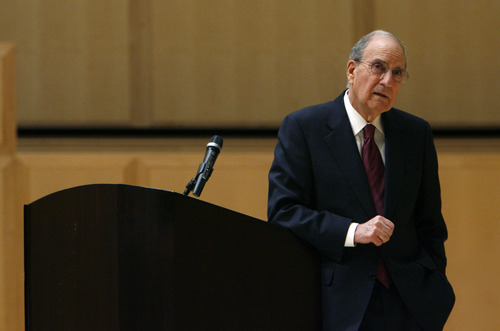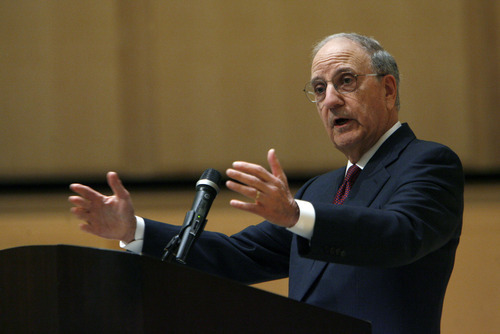This is an archived article that was published on sltrib.com in 2012, and information in the article may be outdated. It is provided only for personal research purposes and may not be reprinted.
There are 11 million people sandwiched between the Mediterranean and the Jordan River, crowding territory considered sacred ground by three religions. Jews enjoy a slight majority over Arabs, whose higher birthrate will soon pose a stark choice for Israel, according to a leading U.S. statesman.
"Israel will have to choose whether to be a Jewish state or a democratic state. It cannot be both," said George Mitchell, the former Democratic senator of Maine, to a University of Utah audience on Thursday.
Or Israel can forge a two-state solution to its 65-year conflict with the Palestinian people, he said. The only way Israel can get the secure borders it desires is to grant its antagonists a viable state, while Palestinians must assure an end to their campaign of terror.
"Neither can achieve their principal objective by denying the other side their principal objective," said Mitchell, himself an Arab-American who most recently served the Obama administration as special envoy for Middle East peace. The former Senate majority leader, a one-time federal judge revered for his even-handedness, was the keynote speaker for the U. Tanner Humanities Center's World Leaders Lecture Forum.
Next on the forum's schedule is Egyptian opposition leader Mohamed ElBaradei in September. He was scheduled to address the forum last year, but withdrew to run for president following the ouster of Hosni Mubarak.
ElBaradei was director general of the U.N.'s International Atomic Energy Agency from 1997 to 2009. Efforts to contain nuclear proliferation won him and his agency the 2005 Nobel Peace Prize.
Both speakers are well versed on how events in the Middle East affect the lives of Americans who know woefully little about the region, which is full of "intersecting conflicts" yet is key to our nation's economic future.
"Oil prices are rising simply on the possibility of war. Imagine what would happened if an all-out regional war actually disrupted oil shipments," Mitchell said. Arab nations may share a dominant faith and language, but they have vastly different histories, national aspirations and sectarian perspectives.
The unrest in Egypt and other nations that erupted in last year's Arab Spring will not be resolved anytime soon, nor in predictable ways, according to Mitchell.
"There will be some good results by our standards and some bad," he said. "History teaches us that when bad governments are removed by revolution, they are often succeeded by even worse governments."
He noted that America's own revolution occurred in a much less complicated context. And yet seven years of active warfare followed the signing of the Declaration of Independence.
Then it was another five years before the Constitution, ratified in 1788, established the United States we know today.
Mitchell believes America's global influence arises from the ideals expressed in those founding documents, which made it a great nation from its birth, not in its military superiority and economic might.
"If we forget the source of our influence and strength, we encounter the problems we are seeing today," said Mitchell, whose Irish grandparents and Lebanese mother immigrated to escape poverty in their homelands.
"Is it any wonder people from the around world come here?" Mitchell said. "They don't want to come here because we have the most accurate missiles. They come here for freedom and opportunity. And they know rights can't be taken away if they belong to religious minority."





